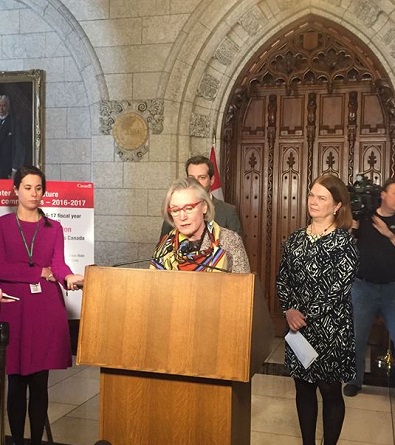Minister Carolyn Bennett speaks at the Thursday announcement in Ottawa. Photo courtesy GovCan – Indigenous Peoples, Facebook.
Indigenous Affairs says Saskatchewan is one of three provinces containing 90 per cent of long-term on-reserve drinking water advisories across Canada.
That statistic came up during the Liberal government’s update delivered in Ottawa on Thursday, nearly a year after they made a five-year pledge to end those advisories on reserve. Minister of Indigenous and Northern Affairs Carolyn Bennett said they’re on track to end all long-term drinking water advisories on reserves that receive INAC funding by 2021.
Last March, the federal budget pledged $1.8 billion over five years to upgrade water and wastewater infrastructure on reserves across Canada. The money is going towards 201 projects and addressing 44 long-term drinking water advisories, Bennett said.
The 28 communities impacted make up more than 60 per cent of the existing long-term advisories.
Bennett said the Liberals are targeting Saskatchewan and two other provinces in their efforts.
“We are focusing additional efforts and expertise in the regions where over 90 per cent over the long-term drinking water advisories are located, namely Ontario, Saskatchewan and British Columbia,” she said.
Bennett said her government is now launching a website to track and measure progress.
“In the past, these things weren’t measured and that’s the reason we are now putting in place a plan where Canadians can watch with us,” she said.
“Ending long-term drinking water advisories and working with First Nations to strengthen water and wastewater infrastructure is the right thing to do. Canadians are watching.”
She said by ensuring funding lasts five years at a time, they’re able to work with First Nations so they can train their own membership to run their water systems and are able to pursue a plan without funding running out.
Beyond that, Thursday’s announcement did not provide any further funds towards the federal goal.
The announcement was not without criticism, particularly when Ontario First Nation Grassy Narrows is dealing with mercury poisoning along its riverbed, and has no offer of help from the federal government.
